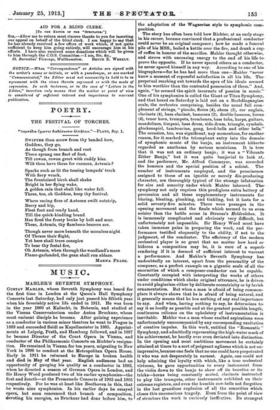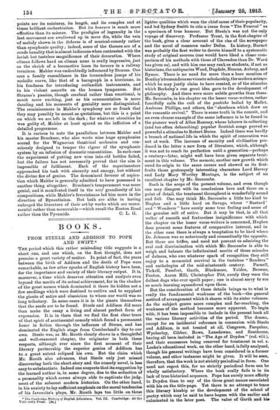MU SI C.
MAHLER'S SEVENTH SYMPHONY.
GUSTAV MAHLER, whose Seventh Symphony was heard for the first time in London at the Queen's Hall Symphony Concerts last Saturday, had only just passed his fiftieth year when his feverishly active life ended in 1911. He was born in the year 1860 at Kalischt, in Bohemia, and studied at the Vienna Conservatorium under Anton Bruckner, whose most eminent disciple he became. After gaining experience as a conductor in various minor theatres he went to Prague in 1883 and succeeded Seidl as Kapellmeister in 1885. Appoint. ments at Leipzig, Pesth, and Hamburg followed, and in 1897 he became Director of the Court Opera in Vienna, and conductor of the Philharmonic Concerts on Richter's resigna- tion. He remained in Vienna for ten years, migrating to New York in 1898 to conduct at the Metropolitan Opera House. Early in 1911 he returned to Europe in broken health and died in May of that year. English audiences had an opportunity of gauging his quality as a conductor in 1892, when be directed a season of German Opera in London, and Sir Henry Wood produced two of his earlier symphonies—the first and fourth—at the Promenade Concerts of 1903 and 1905 respectively. For he was at least like Beethoven in this, that he wrote nine symphonies. In his earlier days he essayed opera, but soon renounced that branch of composition, devoting his energies, as Bruckner had done before him, to
the adaptation of the Wagnerian style to symphonic com- position.
The story has often been told bow Richter, at an early stage in his career, became convinced that a professional conductor could never be an original composer ; how he made a funeral pile of his MSS., boiled a kettle over the fire, and drank a cup. of coffee in honour of the sacrifice. Mahler thought otherwise, and strove with unceasing energy to the end of his life to- prove the opposite. If he never spared others as a conductor,. he never spared himself in any way. According to one of his- biographers—for he has had more than one—Mahler "never knew a moment of reposeful satisfaction in all his life. The- perpetual reaching out towards the apex of his ideals seemed to him worthier than the contented possession of them." And, again, "he seemed the spirit incarnate of passion in music." One of his symphonies is called the Giant or Titan Symphony,. and that heard on Saturday is laid out on a Brobdingnagian scale, the orchestra comprising, besides the usual full com- plement of strings, " piccolo, flutes (4), oboes (3), cor anglais,. clarinets (4), bass clarinet, bassoons (3), double-bassoon, horns. (4), tenor horn, trumpets, trombones, bass tuba, harps, guitars, mandolines, timpani, bass drum, side-drum, triangle, cymbals, glockenspiel, tambourine, gong, herd-bells and other bells."' The occasion, too, was significant, nay momentous, for another reason, for it marked the triumphant entry into the domain: of symphonic music of the banjo, an instrument hitherto- regarded as anathema by serious musicians. It is true that it was not an ordinary banjo ; it was a " Vibrante Zither Banjo," but it was quite banjovial to look at,. and the performer, Mr. Alfred Canimeyer, was accorded the honours and the special position of a soloist. The number of instruments employed, and the prominence assigned to those of an ignoble or merely din-producing_ character, are thoroughly typical of the strange infatuation for size and sonority under which Mahler laboured. The- symphony not only requires this prodigious extra battery of percussion and all these supplementary instruments for blaring, bleating, plunking, and tinkling, but it lasts for m solid seventy-five minutes. There were passages in the opening movement and the finale which seemed to us even. noisier than the battle scene in Strauss's Heldenleben. It is immensely complicated and obviously very difficult, but unfortunately not impossible. Sir Henry Wood must have taken immense pains in preparing the work, and the per- formance testified eloquently to the ability, if not to the. judgment, of the conductor. The efficiency of the modern orchestral player is so great that no matter how bard or hideous a composition may be, it is sure of a superb- rendering if it is deemed of sufficient interest to warrant a performance. And Mahler's Seventh Symphony has. undoubtedly an interest, apart from the personality of the composer, as a perfect example on a gigantic scale of all the- enormities of which a composer-conductor can be capable. Constantly occupied with interpreting the works of others under conditions which choke original utterance, he is driven- to avoid plagiarism either by deliberate eccentricity or by lavish ornamentation. But when a man is afraid of being common- place it always shows that he is afraid of being natural, and it generally means that he has nothing of any real importance to say. And when, having nothing to say, he determines to- say it as loudly as possible and at the greatest possible length; continuous reliance on the upholstery of instrumentation is inevitable. Mahler was a man whose exalted aspirations were. unfortunately unaccompanied by any corresponding exaltation of creative impulse. In this work, entitled the "Romantic " Symphony, and admittedly representing the high-water mark of his achievement, he hardly ever even deviated into distinction. In the opening and most ambitious movement he certainly attained at times to a sort of poignant ugliness which is not un- impressive, because one feels that no one could have perpetrated. it who was not desperately in earnest. Again, one could not help admiring the loyalty with which, like a true orchestral virtuoso, he gave opportunities to every instrument from the violin down to the banjo to show off its beauties or its tricks—horns being constantly muted, clarinets instructed to play like trumpets, other instruments exhibited on their extreme registers, and even the humble cow-bells not forgotten in the last grandiose explosion of all the sonorities which closes this unconscious tragedy. Even from the point of view of structure the work is curiously ineffective. Its strongest points are its noisiness, its length, and its complex and at times brilliant orchestration. But its bravura is much more effective than its science. The prodigies of ingenuity in the ,last movement are swallowed up in mere din, while the vein of melody shown in the Scherzo is of musical-comedy rather than symphonic quality ; indeed, some of the themes are of a 'crude banality that is almost ludicrous when contrasted with the lavish but tasteless magnificence of their decoration. Where climax follows hard on climax none is really impressive, just as the shriek of a locomotive loses its terrors in a railway terminus. Mahler was undoubtedly influenced by Strauss. One apes a family resemblance in the tremendous jumps of his melodic curve, like that of a barograph in a hurricane, in lie fondness for introducing outlandish instruments, and an his violent assaults on the human tympanum. But Strauss's passion, though cerebral rather than emotional, is much more exciting, just as his ornamentation is more :dazzling and his moments of geniality more distinguished. The reminiscences in Mahler's symphony are so frank that they may possibly be meant as quotations, but this is a point on which we are left in the dark ; for whatever atrocities be was guilty of, Mahler at least spared us the infliction of a detailed programme.
It is curious to note the parallelism between Mahler and his master Bruckner, who also wrote nine huge symphonies scored for the Wagnerian theatrical orchestra and con- sciously designed to temper the rigour of the symphonic :system by an infusion of dramatic romanticism. In each case the experiment of putting new mine into old bottles failed, amt. the failure has not necessarily proved that the aim is impossible of fulfilment. Each of the experimenters approached his task with sincerity and energy, but without the.divine fire of genius. The demoniacal fervour of aspira- tion which Mahler is,generally admitted to have possessed is another thing altogether. Bruckner's temperament was more genial, and it manifested itself in the waif grandiosity of his compositions, while Mahlees feverishness led him more in the direction of Byzantinisua. But both are alike in having enlarged the literature of their art by works which are monu- mental rather than memorable—which recall the Euston Road



























































 Previous page
Previous page